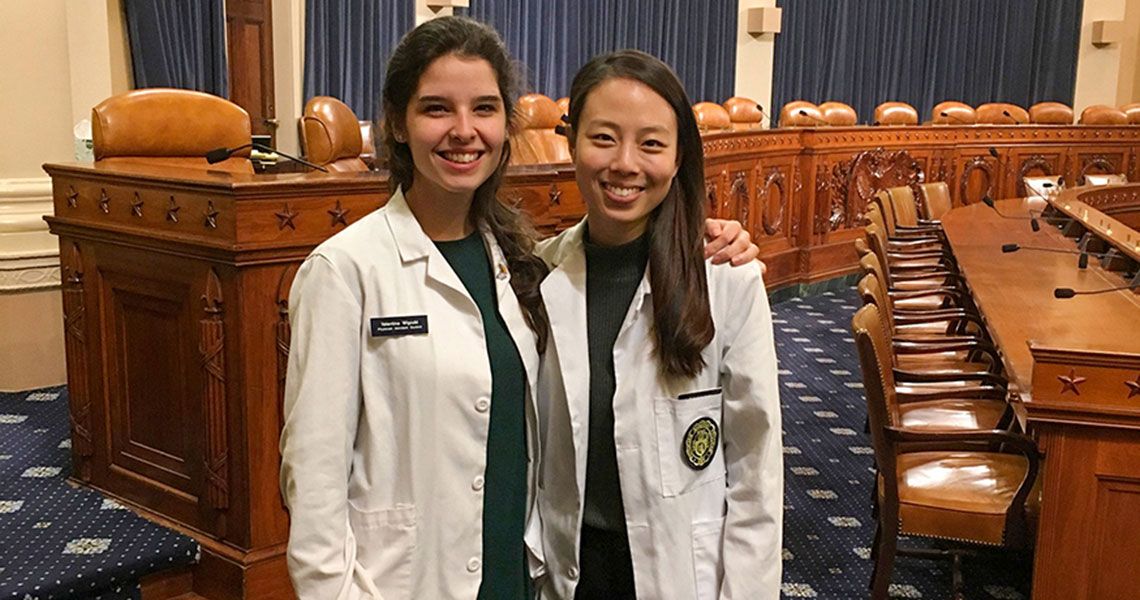This year, the physician assistant (PA) profession celebrated its 52nd anniversary, and much has changed for the profession in that time. However, there are still barriers to overcome for PAs. On Dec. 13, the George Washington University (GW) School of Medicine and Health Sciences (SMHS) PA Class of 2020 headed to Capitol Hill to speak with legislators and advocate for their young but vital profession.
“I have dedicated years of my life to health care, but government and policy feel like a different world to me,” said student Kristen Schoenike. “Hill Day gave my classmates and me an opportunity to learn new concepts and cross paths with people who have dedicated their lives to something completely different than we have.”
The day started for the students with advocacy training led by leaders from the Physician Assistant Education Association (PAEA), followed by meetings on the Hill with congressional representatives on PA education-specific issues. Students addressed two bills supported by PAEA: the Physician Assistant Higher Education Modernization Act and the Physician Assistant Education Public Health Initiatives Act.
Howard Straker, EdD, MPH, PA-C, director of the PA/MPH program and assistant professor of physician assistant studies at SMHS, said issues discussed included the federal student loan parity between PA students and other health profession students; providing funds to historically black colleges and universities and other minority-serving institutions to start PA programs; and the need for funding to maintain and increase clinical training sites for PAs, especially in rural areas; among other topics.
The students visited their home representatives, including those of Reps. Alexandria Ocasio-Cortez (D-NY), Maxine Waters (D-Calif.), and, the only PA lawmaker on the Hill, Karen Bass (D-Calif.). PA student Garnetta Gonzalez said the trip for her was “a great reminder of just how easy it is to advocate, and that our congressional elected officials are accessible.”
She noted that it’s particularly important for PAs to advocate for their profession because the profession is so young that PAs are often left out of important legislation.
One example, she said, is that in Virginia, PAs are not in the language of the legislation that defining who can legally determine mental capacity of a patient. “As a result, PAs are not able to work in behavioral health institutions, despite being trained and qualified medically,” she said.
“For me,” Gonzalez added, “it was also particularly important to tell my story as a minority in the PA profession and to illustrate just how important financing PA programs is to achieving diversity in the field.”
Straker, who serves as president-elect of the PAEA, said one of the reasons SMHS works to educate PAs on health policy and arrange trips to the Hill is because of the leadership skills such activities can instill in the students.
“Leadership is part of the mission of the PA program, and part of leadership is advocating for others and yourself,” he said. “We can provide the unique opportunity for students to go Capitol Hill and learn about federal policies. Learning advocacy now helps develop a skill so they can advocate for their patients in the future.”
Many PA faculty members at SMHS hold leadership positions in some of the most influential PA organizations, which Schoenike said has taught her so much, and help to fuel her desire to take on these issues.
“Without my professors leading by example, I do not think I would have developed an interest in advocacy,” she said. “Even in D.C. you can easily go your entire career as a student and as a provider without ever participating in advocacy. I owe it to the exceptional GW faculty for inspiring me to make this a priority during my time as a student and in my future career as a PA.”



